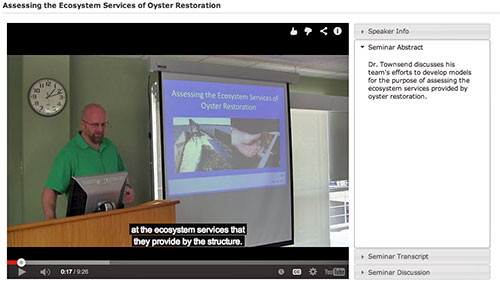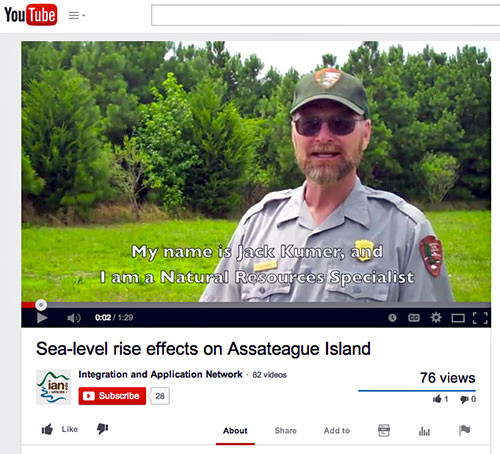Developing video techniques for science communication
Bill Dennison · | Science Communication |At the Integration and Application Network, we have been developing video techniques for science communication. Most of our science communication has focused on print and web media, and we have recently begun developing video products. In the course of developing video products, we have been developing a variety of techniques which will be outlined here.
Seminars: Our original seminars were produced by tape recording a full 45-50 minute seminar and having PowerPoint slides advance as the seminar speaker clicked through the talk. The speaker was not visible during the talk and we found that watching a full length seminar by only viewing the slides was slow and tedious. We adapted a low budget version of the popular Technology, Entertainment and Design (TED) seminar style. We train two cameras relatively close up on the seminar speaker and tape the audio. We also ask the speakers to condense their talk into fifteen minutes and practice it before delivery to fit within the allotted time frame, aiming for a more general audience. In the editing process, we do several things to enhance the seminar videos: a) we transcribe the seminar audio and provide a captioned video (this helps with deaf viewers, non-native English speakers and with technical terms), b) we edit to include footage from both cameras and insert PowerPoint slides, and c) we provide the slides as PDFs, streaming audio files, and seminar transcripts for viewers or listeners who prefer to access content in a diversity of different ways.

Topical introductory videos: We increasingly use videos to introduce topics like report card releases, books or other products. In these videos, we train the camera on a speaker and then insert relevant images as an overlay on the video, over to the side in the manner of a newscaster with relevant images appearing on the screen. We also use captioning as we do in the seminar videos. An example of this type of video is the introduction to the "Dancing with Dugongs" ebook.
Music videos: During various workshops, I will write a song or adapt an existing song that is relevant to the workshop topic and people attending. In the case where I can convince workshop attendees to sing, we will record them singing (I do not sing, due to my "singing issues" as I have been labelled by my children). "Jai Ho!" is a music video produced during a workshop in India. In the case where my musical colleague Gary Cox will create a melody and record his musical instruments for the lyrics that I provide him, we will create a music video using relevant slides and scrolling text to follow the lyrics. An example of this type of music video is "Seagrass Blue Carbon Blues".
Video interviews: We occasionally will interview people and produce a short video to use in educational materials, testimonials or supporting material for web content. These are generally fairly close up and relatively short in duration. The interviewer is off screen and the video is edited without the questions posed, rather the interviewee repeats the question or delivers a response that is self explanatory.

Note that none of these techniques are sophisticated and we use fairly inexpensive equipment and edit the videos using iMovie. We are aiming for quick turnaround, since timeliness is often a key to being relevant. We are generally capitalizing on actual seminars, workshops or product releases that we are already running. The videos simply serve as an added dimension to our existing science communication efforts. We generally have our junior staff or interns tasked with the video production, currently Ali Schwaab who has displayed a strong aptitude to video production. As we learn more about this method of science communication and begin to innovate (e.g., incorporating our IAN symbols into videos), we will continue to develop our video capabilities. It will be interesting to see what our talented team of Science Integrators, Science Communicators and Interns will come up with in the future.
About the author
Bill Dennison

Dr. Bill Dennison is a Professor of Marine Science and Vice President for Science Application at the University of Maryland Center for Environmental Science.